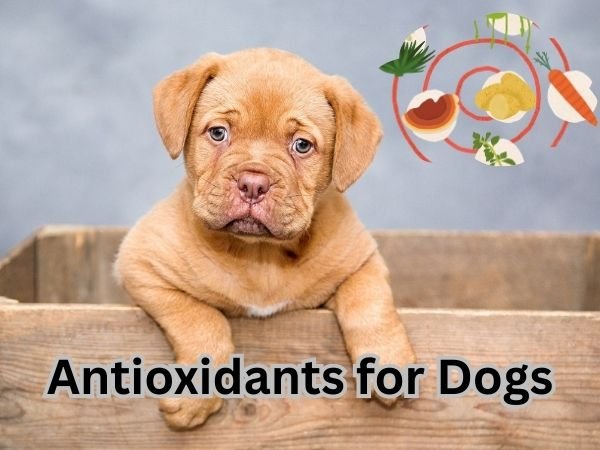
When people hear the phrase “antioxidants for dogs,” two questions often come up: First, do dogs really need antioxidants in their diet, or is this just another health trend? Second, what foods are actually safe-and effective-for giving your pup a real health boost? Antioxidants for dogs are more than just a buzzword; they play a crucial role in protecting your dog’s cells from damage, supporting a strong immune system, and even helping your furry friend stay active and happy as they age. But with so much information (and misinformation) online, it’s easy for pet owners to feel overwhelmed or unsure about what’s best for their canine companions.
In this article, we’ll cut through the confusion and share eight antioxidant-rich foods that are both safe and effective for dogs. Whether you’re looking to support your dog’s overall health, help them recover from illness, or simply add some variety to their meals, you’ll discover practical, vet-approved options you can start using today. Ready to give your dog’s diet a healthy upgrade? Let’s dig in and explore the best antioxidant foods for your four-legged friend!
What Are Antioxidants and Why Do Dogs Need Them?
What Are Antioxidants?
Antioxidants for Dogs- Antioxidants are special nutrients that help protect your dog’s body from damage. They work by fighting off harmful molecules called “free radicals.” Free radicals are tiny particles that can hurt your dog’s cells. These particles come from things like pollution, stress, certain foods, or even just getting older. When there are too many free radicals, it causes something called “oxidative stress in dogs.” This can make your dog feel tired or even get sick more easily.
How Do Antioxidants Work?
Think of antioxidants as your dog’s bodyguards. They find free radicals and stop them from causing harm. This helps keep your dog’s cells healthy and strong. Antioxidants are found in many foods, like fruits and vegetables, and also in some dog supplements.
Why Do Dogs Need Antioxidants?
Antioxidants for Dogs- Dogs need antioxidants for many reasons. Here are some of the main benefits of antioxidants for dogs:
- Support the Dog Immune System: Antioxidants help the immune system fight off germs and keep your dog from getting sick.
- Reduce Inflammation: They can help lower swelling and pain, which is great for dogs with joint problems or allergies.
- Healthy Aging: Antioxidants slow down the aging process, helping your dog stay active and happy as they get older.
- Protect Organs: They help keep your dog’s heart, liver, and other organs working well.
- Better Skin and Coat: Antioxidants can make your dog’s fur shinier and skin healthier.
Signs Your Dog May Need More Antioxidants
Some signs that your dog could benefit from more antioxidants include:
- Getting sick often
- Slow healing from cuts or injuries
- Stiff joints or trouble moving
- Dull coat or itchy skin
- Low energy
How to Give Your Dog More Antioxidants
You can help your dog get more antioxidants by:
- Feeding them antioxidant-rich foods like blueberries, carrots, and spinach (always check which foods are safe for dogs)
- Choosing high-quality dog food with added antioxidants
- Talking to your vet about safe antioxidant supplements
Antioxidants for Dogs- Antioxidants are important for every dog. They help fight oxidative stress in dogs, support the dog immune system, and offer many other health benefits. By adding antioxidants to your dog’s diet, you can help them live a longer, healthier, and happier life. Always talk to your vet before making big changes to your dog’s food or giving them new supplements.
How Antioxidants Work in a Dog’s Body
- Free radicals are tiny, unstable molecules that form in your dog’s body every day.
- They are created when your dog eats, exercises, or is exposed to things like pollution or sunlight.
- Free radicals are missing an electron, so they try to steal one from healthy cells.
- When they do this, they can damage cells, DNA, and even organs.
What Is Oxidative Stress?
- Oxidative stress happens when there are too many free radicals and not enough antioxidants to stop them.
- This stress can harm your dog’s body, leading to problems like aging faster, getting sick more often, or developing diseases such as cancer, heart issues, or joint pain.
- Think of oxidative stress like rust on metal or a cut apple turning brown-too much damage over time makes things break down.
How Do Antioxidants Help?
- Antioxidants are special substances that protect your dog’s body from free radicals.
- They work by giving free radicals the electrons they need, making them stable and harmless.
- Unlike free radicals, antioxidants don’t become unstable after giving away an electron-they stay safe and keep working.
- Your dog’s body makes some antioxidants naturally, but many come from food, especially colorful fruits and vegetables.
Do Dogs Need Antioxidants?
- Yes, dogs need antioxidants to stay healthy
- Dogs are exposed to many toxins in their environment, and their bodies make free radicals all the time.
- Without enough antioxidants, free radicals can build up and cause health problems.
- Antioxidants help keep your dog’s cells, tissues, and organs working well, support the immune system, and slow down aging.
How Do Antioxidants Help Dogs Live Longer?
- Antioxidants protect your dog’s body from damage that can lead to disease and early aging.
- They reduce inflammation, help keep the heart, eyes, skin, and joints healthy, and support brain function as your dog gets older.
- Studies show that dogs with more antioxidants in their diet have healthier brains and bodies as they age, and may live longer, happier lives.
- Giving your dog antioxidant-rich foods or supplements can be a simple way to boost their health and give them the best chance at a long, active life.
Key Points to Remember
- Free radicals are natural but can be harmful in large amounts.
- Oxidative stress is what happens when free radicals outnumber antioxidants.
- Antioxidants neutralize free radicals and protect your dog’s body.
- Dogs need antioxidants for a strong immune system, healthy aging, and disease prevention.
- A diet with plenty of fruits and vegetables can provide the antioxidants your dog needs.
Antioxidants are like tiny superheroes in your dog’s body, fighting off the bad guys (free radicals) and helping your furry friend stay healthy and happy for years to come.
Are Antioxidants Safe for Dogs?
Antioxidants for Dogs- Adding antioxidants to your dog’s diet can be a great way to support their health. But, like anything you give your pet, it’s important to use them safely and wisely.
Are Antioxidants Safe?
- Antioxidants are generally safe for dogs when given in the right amounts.
- Most dogs can eat foods rich in antioxidants, like blueberries or carrots, without problems.
- Antioxidant supplements are also usually safe, but every dog is different. Some dogs may have mild side effects, especially when starting a new supplement.
Importance of Moderation
- Giving too many antioxidants can be harmful. Always follow the recommended dosage on the product or what your vet suggests.
- Too much of any supplement, including antioxidants, can upset your dog’s stomach or cause other issues.
Potential Side Effects
- Some dogs may have mild side effects, such as:
- Upset stomach
- Diarrhea
- Vomiting
- Rarely, dogs can be allergic to certain antioxidant ingredients. Signs of an allergy include:
- Itchiness
- Swelling
- Redness
If you notice any of these signs, stop giving the supplement and talk to your vet.
When to Be Extra Careful
- If your dog is on medication, especially for cancer, always check with your vet before adding antioxidant supplements. Some supplements can interfere with treatments like chemotherapy.
- Natural foods rich in antioxidants are usually safe, but supplements can sometimes cause problems if not used correctly.
Why Veterinary Guidance Matters
- Your vet knows your dog’s health history and can help you choose the right antioxidant sources and amounts.
- They can also help you spot any side effects early and adjust your dog’s diet if needed.
Foods to Feed in Moderation
- Some antioxidant-rich foods, like grapes and raisins, are toxic to dogs and should never be given.
- Stick to dog-safe options like blueberries, spinach, and carrots, but always start with small amounts.
Key Takeaways
- Antioxidants can help keep your dog healthy, but moderation is key.
- Watch for any side effects when starting new foods or supplements.
- Always talk to your vet before making big changes to your dog’s diet.
By following these tips, you can safely add antioxidants to your dog’s routine and help them live a happy, healthy life.
8 Safe and Effective Antioxidant-Rich Foods for Dogs
Antioxidants for Dogs- Adding antioxidant foods for dogs to your pet’s diet is a simple way to boost their health and happiness. Antioxidants help protect your dog’s cells, support their immune system, and can even slow down aging. Here are eight safe fruits for dogs and vegetables for dogs that are packed with natural antioxidants. These dog superfoods are easy to find, tasty, and offer real health benefits.
1. Blueberries
- Key Antioxidants: Vitamin C, Polyphenols
- Benefits for Dogs:
- Supports the immune system
- Promotes brain health and sharp thinking
- Serving Tips & Safety Notes:
- Offer a few fresh or frozen blueberries as a treat
- Wash well and avoid giving too many at once to prevent upset stomach
- Great for dogs of all sizes
2. Strawberries
- Key Antioxidants: Vitamin C, Polyphenols
- Benefits for Dogs:
- Reduces inflammation
- Helps keep skin and fur healthy
- Serving Tips & Safety Notes:
- Slice into small pieces to avoid choking
- Remove the green tops
- Serve fresh in moderation, as too much sugar can upset your dog’s tummy
3. Sweet Potatoes
- Key Antioxidants: Beta-Carotene, Vitamin E
- Benefits for Dogs:
- Supports eye health
- Boosts the immune system
- Serving Tips & Safety Notes:
- Cook thoroughly (boil, bake, or steam)
- Serve plain, without butter, salt, or seasoning
- Remove the skin for easier digestion
4. Carrots
- Key Antioxidants: Beta-Carotene
- Benefits for Dogs:
- Supports healthy vision
- Provides antioxidant protection
- Serving Tips & Safety Notes:
- Offer raw as a crunchy snack or steam for easier chewing
- Cut into bite-sized pieces to prevent choking
- Low in calories, making them a great treat for overweight dogs
5. Spinach
- Key Antioxidants: Vitamin E, Polyphenols
- Benefits for Dogs:
- Promotes healthy cells
- May slow signs of aging
- Serving Tips & Safety Notes:
- Serve cooked and chopped to aid digestion
- Use only small amounts, as too much spinach can cause stomach upset
- Avoid adding salt or spices
6. Green Beans
- Key Antioxidants: Vitamin C, Flavonoids
- Benefits for Dogs:
- Low-calorie snack
- Supports digestive health
- Serving Tips & Safety Notes:
- Offer steamed or raw, cut into small pieces
- Avoid canned green beans with added salt
- Great for dogs on a weight-loss plan
7. Kale
- Key Antioxidants: Vitamins A, C, and E
- Benefits for Dogs:
- Strengthens the immune system
- Helps detoxify the body
- Serving Tips & Safety Notes:
- Serve cooked and chopped to reduce risk of stomach upset
- Use in small amounts, as too much can cause digestive problems
- Always wash thoroughly before serving
8. Eggs (Eggshell Membrane)
- Key Antioxidants: Collagen, Glucosamine
- Benefits for Dogs:
- Supports joint health
- Improves mobility, especially in older dogs
- Serving Tips & Safety Notes:
- Cook eggs fully before serving
- Eggshell membrane can be given in small amounts, but consult your vet first
- Avoid adding oil, butter, or seasoning
Antioxidants for Dogs- Including these natural antioxidants for dogs in your pet’s meals can make a big difference in their health and happiness. Always introduce new foods slowly and watch for any signs of allergies or tummy troubles. For the best results, talk to your veterinarian about the right amount and variety for your dog’s unique needs. With these antioxidant-rich foods, you’re giving your furry friend the building blocks for a long, healthy, and joyful life!
How to Add Antioxidant Foods to Your Dog’s Diet
Adding antioxidant foods to your dog’s meals is a great way to help them stay healthy and happy. Antioxidants help protect your dog’s body from harmful substances called free radicals. These foods can boost your dog’s immune system, keep their coat shiny, and support their overall well-being. Here’s how you can safely and easily add antioxidant-rich foods to your dog’s diet.
Practical Tips for Introducing New Foods Safely
It’s important to introduce new foods to your dog slowly. This helps prevent stomach upset and lets you watch for any allergies.
Follow these steps:
- Start Small: Give a tiny piece of the new food and see how your dog reacts.
- One at a Time: Only add one new food at a time. This makes it easier to spot any problems.
- Watch for Reactions: Look for signs like itching, vomiting, or diarrhea. If you notice any, stop the new food and talk to your vet.
- Mix with Regular Food: Blend the new food into your dog’s usual meals to make the change easier.
Raw vs. Cooked Antioxidant Foods
You might wonder if it’s better to give your dog raw or cooked antioxidant foods. Both can be good, but there are some differences.
- Raw Foods: Some fruits and veggies, like blueberries and apples, can be given raw. Make sure to wash them well and remove any seeds or pits.
- Cooked Foods: Cooking can make some foods easier to digest. For example, carrots, sweet potatoes, and spinach are often better when lightly steamed or boiled.
- No Seasoning: Never add salt, sugar, or spices. Plain is always best for dogs.
Portion Sizes: How Much Is Just Right?
Giving the right amount is important. Too much of any new food can upset your dog’s stomach.
- Small Dogs: Start with about a teaspoon of new fruits or veggies.
- Medium Dogs: Try one to two teaspoons.
- Large Dogs: You can give up to a tablespoon.
- Frequency: You can offer antioxidant foods a few times a week or as a small daily treat, but they should not replace your dog’s regular balanced food.
Can Dogs Eat Fruit Every Day?
Antioxidants for Dogs- Many fruits are safe for dogs in small amounts. Blueberries, apples (without seeds), and bananas are good choices. However, not all fruits are safe. Grapes, raisins, and cherries are toxic to dogs and should never be given.
- Safe Fruits: Blueberries, apples, bananas, watermelon (seedless), and strawberries.
- How Often: A small amount daily is usually fine, but always watch for tummy troubles.
How Much Is Too Much?
Antioxidants for Dogs- Too many fruits or veggies can cause diarrhea or upset stomach. Treat antioxidant foods as a snack, not a meal.
Tips to avoid overfeeding:
- Antioxidant foods should make up no more than 10% of your dog’s daily food.
- Always balance treats with your dog’s main diet.
- If you’re unsure, ask your vet about the right amount for your dog’s age and size.
Adding antioxidant foods to your dog’s diet can be simple and rewarding. Start slow, choose safe options, and always watch your dog for any changes. With a little care, you can help your dog enjoy the many health benefits of antioxidants and keep their tail wagging for years to come!
Supplements vs. Whole Foods: What’s Best for Your Dog?
Antioxidants for Dogs- When it comes to giving your dog antioxidants, you have two main choices: whole foods or supplements. Both options can help your dog stay healthy, but they work in different ways.
Whole Food Sources of Antioxidants
- Whole foods include fruits, vegetables, grains, and herbs that naturally contain antioxidants.
- Common antioxidant-rich foods safe for dogs are blueberries, sweet potatoes, spinach, pumpkin, apples, and carrots.
- These foods offer antioxidants in their natural and easy-to-absorb forms, helping your dog’s body use them more effectively.
- Whole foods also provide extra nutrients like fiber and vitamins, which support digestion and overall health.
- Dogs often enjoy the taste and texture of real foods, making it easier to add antioxidants to their diet.
- Feeding a variety of antioxidant-rich foods gives your dog a broad mix of nutrients for better health.
Antioxidant Supplements for Dogs
- Supplements are concentrated forms of antioxidants, such as pills, powders, or chews.
- They can be helpful for dogs with special needs, like seniors, working dogs, or those recovering from illness.
- Supplements are useful if your dog is picky or has trouble eating enough antioxidant-rich foods.
- It’s important to choose supplements made specifically for dogs, as human products may not be safe.
- Giving too many supplements can be risky and may cause health problems, so always follow your vet’s advice.
- Supplements can be more expensive, especially if you need several types for complete coverage.
Which Is Better for Your Dog?
- Whole foods are usually the best and safest way to give your dog antioxidants. They are natural, easy for your dog’s body to use, and come with other health benefits.
- Supplements can help in special cases, like when a dog is older, sick, or needs extra support.
- Always talk to your vet before starting any supplement, so you know the right type and amount for your dog.
Tips for Pet Owners
- Add small amounts of safe fruits and vegetables to your dog’s meals for a natural antioxidant boost.
- Watch for any allergies or stomach upset when trying new foods.
- If your vet recommends supplements, choose high-quality products made just for dogs.
- Remember, balance is key-too much of any one thing, even antioxidants, can be harmful.
Antioxidants for Dogs- Choosing between supplements and whole foods depends on your dog’s needs. For most dogs, a diet rich in natural, whole foods is the best way to get antioxidants. But if your dog needs extra help, the right supplement-chosen with your vet’s guidance-can be a helpful addition to their routine
Conclusion
Antioxidants for Dogs- Adding antioxidants to your dog’s diet is a simple way to help them stay healthy and happy for years to come. Antioxidants protect your dog’s body, boost their immune system, and help them age gracefully. Before making any changes to your dog’s food, always check with your veterinarian. They can help you choose the best options for your pet.
Call to Action
Do you have a favorite antioxidant-rich treat your dog loves? Have you noticed changes in your dog’s health after adding more antioxidants to their diet? Share your stories or tips in the comments below!
FAQ
What are antioxidants for dogs?
Antioxidants are natural substances that help protect your dog’s body from damage. They support the immune system, fight cell damage, and may slow aging. You can find them in fruits, veggies, and some dog foods.
What are the best antioxidant foods for dogs?
Blueberries, spinach, carrots, sweet potatoes, apples (no seeds), broccoli, pumpkin, and green beans are great sources of antioxidants for dogs. These foods are safe in small amounts and can support your dog’s health.
Are antioxidants safe for all dogs?
Yes, most dogs can safely have antioxidants in their diet. But always start with small amounts and talk to your vet, especially if your dog has allergies or health issues.
How do antioxidants help my dog’s health?
Antioxidants help your dog by boosting the immune system, fighting harmful cells, and supporting brain and heart health. They may also help older dogs stay active and alert longer.
Can I give my dog human antioxidant supplements?
No, human supplements may have unsafe ingredients or doses for dogs. Always choose dog-safe products or give antioxidant-rich foods made for dogs. Ask your vet before using any supplements.




